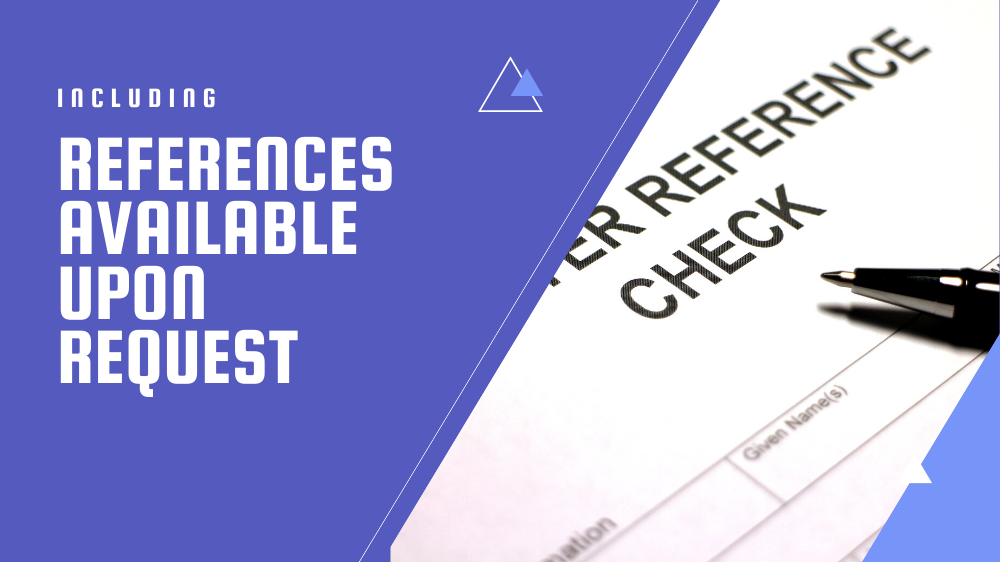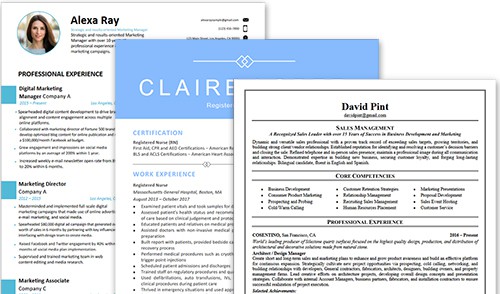Including References Available Upon Request on a Resume
Having strong references can give you a leg up during the hiring process. Learn whether you need to stick the phrase “references available upon request” on your resume and how to build a list of references you can feel good about.

If you’re currently on the job hunt, you may be wondering about one of the most commonly asked questions for resume writing – should you include the phrase, “References available upon request,” on your resume?
And although references are a great way to prove yourself in the job market, the short answer is: No, they do not belong on your resume.
Instead, use that space to add as much detail as possible about your hard and soft skills, employment history, and relevant credentials or accomplishments.
To further understand the role that references play when it comes to your job search, keep the following advice in mind.
Also, if you really aren’t sure how to go about writing your resume, consider using a resume writing services to give you a leg up.
What is a Reference?
In terms of a resume, references refer to contacts within your professional network that have experience working with you in the past. They can speak to your skills and give recruiters first-hand feedback on your work ethic.
You’ll likely only be asked to provide a list of references if you’ve successfully reached the final rounds of the interview process. After all, potential employers are typically swamped with applicants and simply don’t have the time to spend reviewing every candidate’s references.
So, if you’re lucky enough to have made it through most of the interview process and now approach the final stages, how should you provide your references once they’re requested?
Let’s dive in.
How Should You Approach References Available Upon Request?
Once an employer has requested references from you, begin crafting a document where you can organize your references and their contact information in a neat and organized way. This document should be separate from your resume, and there’s no need to edit your current resume to mention that you have references available upon request.
The new document should be titled, “Professional References,” or something similar, and its style should match the look of both your resume and your cover letter.
Before you list your references, keep in mind you’ll need to identify their relationship with you and how long you’ve known them. Additionally, you’ll need to include other basic information for each reference such as their name, current title, company name, phone number, and professional email address.
Be sure to leave each reference’s personal contact information such as their address off of your references page. Employers simply don’t need that information, and your contacts surely wouldn’t want you to give their personal information out to anyone.
How Many References on a Resume Should I Include?
As you begin brainstorming who to include on your list of professional references, try to keep your final list to no more than three contacts.
Although you may have a dozen references available upon request that would be more than willing to sing your praises, remember to be realistic and respectful of the hiring manager’s time.
Whittling down your references may be challenging, but keep in mind that it’s best to value quality over quantity when it comes to your professional references.
How to Choose Your References
Putting together a list of references requires just as much effort as writing a resume or a cover letter. You must be selective, choose the best contacts you have, and be sure your references are willing and prepared to speak on your behalf.
As you consider which few contacts you should list on your professional references document, make sure you’re taking the proper steps to get the best return on your efforts.
Consider Your Network
For those with workplace experience, do your best to select a past manager, boss, or former colleague. While former coworkers who you became friendly with overtime may seem like a great choice, the best references to provide future employers should have significant working experience with you and be able to speak to your work habits with detail.
If you’re just beginning your professional journey and looking to land your first career, you might consider past teachers, college professors, coaches, or advisors. Even when your professional experience is lacking, don’t underestimate your relationships with educational figures.
As you consider your network, keep in mind that close friends or family members should only be listed if you don’t have any other options. While friends and family can surely speak to your personality, they rarely have the necessary experience to accurately describe your professional skills.
Be Specific
As we discussed, your list of references should be highly-tailored to benefit you most in your job search.
And rather than listing off a slew of your great professional acquaintances, consider the following to help your narrow your list and get the most bang for your buck:
- Choose references that work within the same industry for which you’re applying
- If you’re applying for a manager-level role, list a reference who has managerial experience
- Pick references that can best speak to your skillset
- Limit your list of references to only those who you’re confident can provide helpful and relevant information for the role you’re applying for
Although the choice is ultimately yours, being specific with your selections is the best way to effectively represent your skillset and work ethic.
Ask for Permission First
Before you hand over your list of references to an interested employer, be sure you’ve done your due diligence and have asked for permission from each of your references.
Listing references without their knowledge is never recommended. Not only is listing a reference without their permission impolite, but it can hinder your chances of getting the job.
Unlike an unprepared reference, a reference who’s expecting a call from your potential employer will have more time to prepare for the conversation, sort out their thoughts, and make note of any great experiences they’ve had working with you that they’d like to bring up.
Conclusion
You’ve spent valuable time building up your professional network! So, when you’re looking to make a career change, your best connections within your network are a fantastic tool to help you impress future employers.
And if your references’ good words helped you land the gig, don’t forget to thank them for their time and contribution. Simple recognition or even a thank you note can go a long way.
